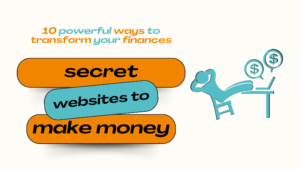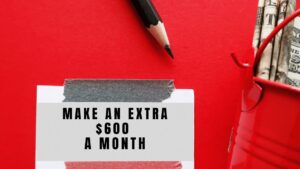Many people who don’t earn a lot of money wonder, “Can I buy a house if I make $25,000 a year?” It might seem challenging, but it’s possible.
In this blog post, we’ll talk about what you can do to buy a house if you make around $25,000 per year. So, if you’ve ever wondered if you can own a home with a lower income, keep reading to find out how you can make it happen.
Use our mortgage calculator to see how much you can afford to spend on a house. This will help you start your journey towards owning a home the way you want.
1. Can You Buy a House on a $25k Income?
Buying a house when you earn $25,000 a year can happen, but it takes some careful money planning. Here’s how:
Make a Budget: Start by tracking your spending and make a budget. This means knowing exactly where your money goes each month.
Save for a Down Payment: You’ll need some money upfront to buy a house. Save a portion of your income each month to build up this savings.
Check for Help: Look into programs that can assist you in buying a home. There are some government and community programs that can help low-income individuals.
Find a Cheaper Home: Be realistic about what you can afford. You might need to look for a smaller or less fancy house that fits your budget.
Location Matters: Some places have lower living costs than others. Consider moving to an area where housing is more affordable.
Get Creative with Financing: Explore different ways to pay for a house. This might include special loans or arrangements that work for your situation.
Improve Your Credit Score: A better credit score can get you a lower mortgage rate. Pay your bills on time and manage your debts wisely to boost your credit score.
It might take time and effort, but with careful planning and determination, you can become a homeowner on a $25,000 income.
2. What is The 28/36 rule
28%: This part of the rule suggests that you shouldn’t spend more than 28% of your monthly income on housing expenses. This includes your mortgage or rent, property taxes, and homeowners insurance.
36%: The second part of the rule says that your total debt payments, including housing expenses plus any other debts like credit card bills or car loans, should not exceed 36% of your monthly income.
So, in a nutshell, the 28/36 rule helps you figure out how much you can reasonably afford to spend on housing and other debts each month, based on your income. It’s a guideline to help ensure that you don’t overextend yourself financially.
 3. The 28/36 Rule (i make 25k a year can i buy a house?)
3. The 28/36 Rule (i make 25k a year can i buy a house?)
The 28/36 rule provides a helpful framework for determining if you can buy a house on a $25,000 annual income. With this income level, your monthly housing expenses, ideally, should not exceed $583 (28% of monthly income), which includes mortgage payments, property taxes, insurance, and utilities. Simultaneously, your total debt obligations, including housing costs and other debts like car loans or credit card payments, should not surpass $750 (36% of monthly income).
While it’s possible to find affordable housing options and adjust your budget accordingly, it’s crucial to be realistic about your financial situation and consider factors like credit score, down payment, and available assistance programs to make homeownership attainable on a $25,000 income.
4. Debt-to-Income Ratio
The Debt-to-Income Ratio, or DTI, is like a financial balance check. It compares how much money you owe each month (like loan payments and credit card bills) to how much money you make each month. This ratio is expressed as a percentage. Lenders use DTI to see if you can handle more debt, like a new loan, and decide if you’re a good candidate for borrowing money. So, the lower your DTI, the better your chances of getting approved for a loan.
5. The 50% Rule in Homebuying with a $25,000 Yearly Income
The 50% rule when buying a home suggests that you should allocate no more than 50% of your monthly income to cover all housing-related expenses, including mortgage payments, property taxes, insurance, and maintenance costs, to maintain financial stability and avoid overstretching your budget.
6. What’s the Best Mortgage for You?
 When you’re buying a house, one big choice is picking the right mortgage. There are lots of options, so it might feel tricky to know which one is right for your money. Here are some simple things to think about when choosing your mortgage:
When you’re buying a house, one big choice is picking the right mortgage. There are lots of options, so it might feel tricky to know which one is right for your money. Here are some simple things to think about when choosing your mortgage:
How Long You’ll Stay: If you plan to stay a short time, think about an adjustable-rate mortgage (ARM). It starts with a low interest rate but can go up later.
Stability vs. Change: If you want your payments to stay the same, go for a fixed-rate mortgage. Your interest rate doesn’t change.
Your Credit Score: Having a good credit score gets you better deals. Work on improving it before getting a mortgage.
Money You Need Upfront: Some mortgages need a bigger down payment and have extra costs. Consider this.
There’s no one answer for everyone. Think about your money and goals before choosing what’s best for you.
7. The current state of the housing market
The housing market is tricky right now, especially if you make $25,000 a year. Prices are up, mainly due to high demand and low interest rates. Don’t forget about extra costs like taxes and maintenance. But with research, planning, and assistance programs, you can still find an affordable home.
8. How much should you put down?
When buying a house, consider your initial payment’s impact. Paying at least 20% lowers interest rates and avoids private mortgage insurance (PMI). If saving 20% is tough, explore options like FHA (3.5%) or regular loans (5% or 10%). But remember, lower initial payments may mean higher monthly mortgage costs. Find the right balance based on your current income and expenses to make a wise choice.
9. What are the other costs of buying a house?
Down Payment: Upfront payment, a percentage of the house price, may vary based on credit score and loan type.
Closing Costs: Expenses like appraisals, inspections, title searches, and legal fees, typically 2% to 5% of the house price.
Homeowners Insurance: Coverage cost varies by location and desired protection against events like fires, theft, or disasters.
Property Taxes: Government taxes based on your house’s value, funding services like schools and roads.
Maintenance and Repairs: Ongoing costs for lawn care, painting, and fixes.
If your annual income is $25,000, explore affordable housing programs or save more for a down payment to make homeownership feasible.
10. Is it a good time to buy a house?
This depends on a few factors.
First, assess the housing market. Check if prices are stable or rising and if interest rates are low. Currently, with low rates and steady prices in many areas, it could be a favorable time.
Next, review your financial situation. Ensure you have savings for a down payment and can manage monthly mortgage and bills. Create a budget to confirm.
Consider your plans. Are you staying in one place for a while? Buying a house is a longer-term commitment.
The decision varies for everyone. Research, consult experts, and think carefully.
If you earn $25,000 annually, factor in additional costs. While it may be challenging, explore affordable housing programs or save more for a down payment to increase your chances of homeownership.
11. Where should you buy a house?
1. When choosing a house, location matters. Consider your lifestyle – city buzz, suburban calm, or rural serenity.
2. Check job prospects; ensure it aligns with your career goals.
3. Evaluate living costs, high salaries might come with a high price tag.
4. Factor in proximity to family and friends.
5. Assess crime rates, schools, and transportation.
6. Your ideal location is unique – prioritize what matters to you before deciding.
12. How to buy a house
Determine Your Budget: Calculate your annual income, e.g., $25k, and assess your debts. Know how much you can spend.
Consider Upfront Costs: Decide on the initial payment. More upfront money lowers loan costs and avoids extra insurance. Explore programs for low-income or first-time buyers if needed.
Account for Additional Costs: Remember closing costs (usually 2-5% of the home’s price) and repair expenses.
Choose the Right Location: Carefully select a location based on affordability, job opportunities, nearby amenities, and future growth potential.
Engage Real Estate Professionals: Hire a competent real estate agent to negotiate deals and ensure a smooth transaction.
Secure Loan Approval: Get pre-approved for a loan to show sellers your commitment to the purchase.
With careful planning, even with an annual income of $25k, homeownership is achievable. Consider all aspects of the process for a successful purchase.
Summery on (i make 25k a year can i buy a house)
Earning 25k a year may make it challenging to buy a house, as it limits your borrowing capacity and down payment options. Consider building your savings, improving your credit, and exploring affordable housing programs. In the short term, it might be prudent to focus on financial stability and long-term planning before pursuing homeownership.
Read More: i make $45,000 a year how much house can i afford
Read More: How much house can i afford with 100k salary
Read More: if i make $90,000 a year how much house can i afford
Read More: i make $85000 a year how much house can i afford
- Secret Websites to Make Money in 2025 - April 30, 2025
- Webull vs Robinhood: Which one is better in 2025? - February 14, 2024
- Bubble Cash Review For 2024: Is it Legit or a Scam? - December 30, 2023







2 thoughts on “i make 25k a year can i buy a house”